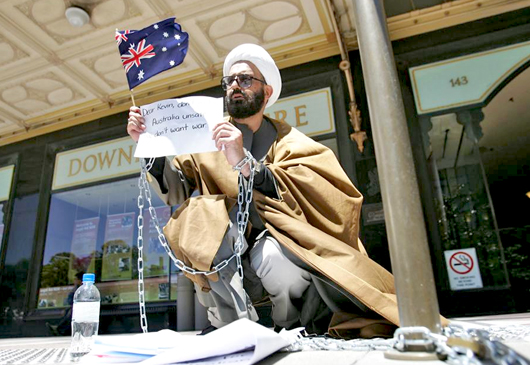Sydney, Dec 16: Heavily armed police officers ended a hostage crisis at the Lindt Chocolate Cafe here around 2:45 am local time on Tuesday, storming its premises where an armed man — said to be a self-proclaimed Sheik — held employees and customers, including two Indians, captive for more than 16 hours.
The two Indians, Vishwakant Ankireddy and Pushpendra Ghosh, both employees of Infosys, are safe.
The number of casualties was not immediately clear, but agencies reported that three people were dead, including the gunman.
“Sydney siege is over. More details to follow,” the New South Wales Police said in a tweet.
Earlier, the police said that the hostage-taker was Man Haron Monis, an Iranian-born man in his 50s with a criminal record, who called himself Sheik Haron.
Monis was carrying a black flag with white Arabic script similar to those used by Islamic militants on other continents, and the flag was later displayed in the window of the cafe.
Five people, including two cafe employees, had fled by 7 pm local time, but it was not clear whether the assailant had allowed them to leave or they had escaped. Helicopters hovered over the city, the train network was temporarily stopped and buildings, including the nearby Sydney Opera House, were shut down.
According to “The Age”, Monis was out on bail in two separate criminal cases. He was charged in November 2013 for murdering his ex-wife, Noleen Hayson Pal, who was stabbed and set on fire in an apartment in Werrington.
In April 2014, Monis was charged for sexual assault. The police said that Monis held himself out as a spiritual healer and conducted business on Station Street, Wentworthville. A website apparently associated with Monis includes condemnation of the US and Australia for their military actions against Islamic militants in Iraq and Afghanistan.
A Muslim community leader in Sydney, Dr Jamal Rifi, said in a televised interview: “Everything he stands for is wrong. It has nothing to do with Islam.”
Prime Minister Tony Abbott, before Monis was publicly identified, referred to him as “an armed person claiming political motivation.” The US Consulate General in Sydney, about a block from the cafe, and the Consulate General of India in Sydney, barely 400 metres from the cafe, were evacuated.
An Islamic State spokesman, Abu Muhammad al-Adnani, issued a statement in September asking Muslims in Australia to carry out attacks. On September 12, Abbott raised Australia's terrorism alert level to high from medium. He gave the police broader powers to arrest terror suspects and tightened restrictions on the media's reporting on national security matters. Two weeks later, police fatally shot a man who attacked them with a knife.






Comments
Add new comment